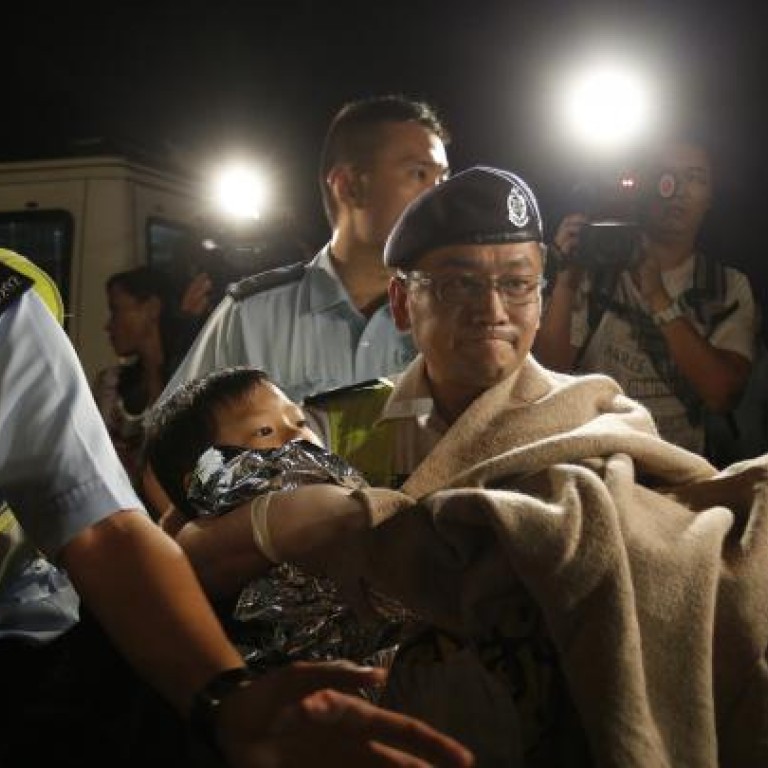
TV media should be ashamed of ferry disaster reporting
Alice Wu says freedoms don't give some journalists the right to ask cruel, stupid questions
Perhaps all too often my favourite former professor, Tom Plate, used to say: "There are no stupid questions." But it was just his way of encouraging learning and inquisitive minds. That's what schools are for - they're where we should all be entitled to immunity from persecution (not to mention ridicule) for stupidity.
But what happens after we leave our alma maters? Well, theoretically, we grow up - and take responsibility for our actions, and yes, residual stupidity.
We make stupid mistakes, ask stupid questions, and for that, we usually get what we deserve. It's part of life: I have the right to free speech, but if my stupidity and ignorance offends others, they have every right to tell me to "shut up".
And so, here I am, telling some in the news media to "shut up".
In Hong Kong, that last statement will generate gasps of disbelief. It will be considered sacrilegious, and I could be persecuted - Cultural Revolution style - with my counter-revolutionary comment. But where does one's right to report end and right to disrespect begin?
The Lamma ferry tragedy has shocked Hong Kong. Rescue responses, reports concluded, were swift, professional and massive. Rescue workers, as well as some survivors, have been lauded as local heroes (as they should be).
The media had a serious job to do. When an accident of this kind occurs, we rely on the media to gather information, and, yes, to demand answers. But when information is just not coming out quickly enough and the cameras are rolling nonetheless, our reporters sometimes just lose all their senses.
Like many people here in Hong Kong, I was glued to the television set on the night of the tragedy. But, before I knew it, anger was all I was feeling - anger for the way some reporters completely abused their power and right to report.
What is the point of standing in the way of the rescue crew? There are inherent complexities to rescue operations of this magnitude. As the first victims landed at the pier, with ambulances ready to take them to hospital, why would anyone stand in the way? Over and over again, the news media at the scene seemed utterly unmoved by repeated desperate pleas by paramedics: Please, move out of the way. Please, we are trying to save lives here. Please…"
What is the point of sticking the camera in the faces of a couple who had just been rescued? They were frantic because they did not know the whereabouts of their two children. The mother, dripping wet, traumatised and worried sick, hadn't even had the chance to sit down with her rescued husband when she was greeted by an assault of cameras, spotlights and stupid questions.
Really, what is the point of asking the couple whether their children knew how to swim? Did the media have the answer to the couple's pressing question ("where are the kids?")? They did not; so what is the relevance of the swimming question?
Absolutely none, from the news reporting perspective, or from the "trying to help victims" perspective. It was a stupid question, plain and simple.
This continued the following day. A man looking for a missing relative was followed by news crews to several hospitals and the morgue. He still couldn't find her but was asked: "How are you feeling now?"
Seriously, what kind of question is that? How would you feel if a member of your family had gone missing after boarding a ferry that went from horizontal to vertical in a matter of minutes, with debris falling onto people and trapping the drowning victims inside?
As unbelievable as it may seem, there was a follow-up question that was just as dumb but infinitely more cruel: "You don't have much hope now, do you?"
How dare you! To feed off others' tragedy, and to ask stupid questions for a few more moments of camera-rolling time. It's inhumane. It's even worse than the non-stop filming of rescue workers conducting CPR (which also happened). Did we need so much of that; capturing victims at their most vulnerable? Have a little respect.
The sine qua non of a free media as the source of truth gives it the power to expose and enlighten, but it does not, for a second, mean that it can excuse itself from the responsibilities and obligations that come with its power. This isn't the first time I've lambasted the media for failing to see its irrelevance, stupidity, crudeness and cruelty.
During the Manila hostage crisis, a little over two years ago, the news media did a dangerous but tremendous job in covering the events, but it also exploited the tragedy of a 15-year-old survivor who lost both parents to the cold-blooded shooting spree. I was just as outraged when I saw cameras and microphones in the young girl's face as she lay in her hospital bed, unaware of her parents' death, being asked: "Where are you parents? Do you miss them?"
What is the point of making a drama out of a young woman being unaware of what the world already knew? I called it "cruel, unnecessary and ruthless" then and I repeat the same words again here.
Media freedom is a precious thing, fought for and defended by people who are not privileged members. Don't defame it, and don't give anyone the excuse to take that away by being stupid.
So, sorry Professor Plate, there stupid questions and I just gave you a sample of them.

